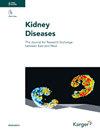一项前瞻性多中心观察性研究:急性肾损伤危重患者体液平衡的潜在轨迹与临床结果之间的关系
IF 3.2
4区 医学
Q1 UROLOGY & NEPHROLOGY
引用次数: 1
摘要
前言:我们旨在确定不同的液体平衡(FB)轨迹,并研究FB轨迹对重症监护病房(ICU)急性肾损伤(AKI)患者临床结局的影响,以及液体过载(FO)与死亡率之间的剂量-反应关系。方法:我们从北京急性肾损伤试验(BAKIT)中获得数据。共纳入1529例AKI危重患者。主要终点为28天死亡率,医院死亡率、ICU死亡率和AKI分期为次要终点。采用基于组的轨迹模型来确定前7天FB的轨迹。采用多变量逻辑回归来检验FB轨迹与临床结果之间的关系。使用限制三次样条的逻辑回归模型来检验FO与28天死亡率之间的剂量关系。结果:确定了三种不同的FB轨迹:低FB(1,316, 86.1%),降低FB(120,7.8%)和高FB(93,6.1%)。与低FB相比,高FB与28天死亡率增加(比值比[OR] 1.94, 95%可信区间[CI] 1.17-3.19)和AKI分期(OR 2.04, 95% CI 1.23-3.37)相关,而降低FB与28天死亡率降低约一半相关(OR 0.53, 95% CI 0.32-0.87)。ICU死亡率和住院死亡率的结果相似。我们观察到最大脂肪含量与28天死亡率呈j型关系,最大脂肪含量时的最低风险为2.8% L/kg。结论:AKI危重患者FB的不同发展轨迹与临床预后相关。FB高于或低于一定范围与死亡风险增加有关。进一步的研究应该探索这种关系,并为AKI危重患者寻找最佳的液体管理策略。本文章由计算机程序翻译,如有差异,请以英文原文为准。
Association between Latent Trajectories of Fluid Balance and Clinical Outcomes in Critically Ill Patients with Acute Kidney Injury: A Prospective Multicenter Observational Study
Introduction: We aimed to identify different trajectories of fluid balance (FB) and investigate the effect of FB trajectories on clinical outcomes in intensive care unit (ICU) patients with acute kidney injury (AKI) and the dose-response association between fluid overload (FO) and mortality. Methods: We derived data from the Beijing Acute Kidney Injury Trial (BAKIT). A total of 1,529 critically ill patients with AKI were included. The primary outcome was 28-day mortality, and hospital mortality, ICU mortality and AKI stage were the secondary outcomes. A group-based trajectory model was used to identify the trajectory of FB during the first 7 days. Multivariable logistic regression was performed to examine the relationship between FB trajectories and clinical outcomes. A logistic regression model with restricted cubic splines was used to examine the dose relationship between FO and 28-day mortality. Results: Three distinct trajectories of FB were identified: low FB (1,316, 86.1%), decreasing FB (120, 7.8%), and high FB (93, 6.1%). Compared with low FB, high FB was associated with increased 28-day mortality (odds ratio [OR] 1.94, 95% confidence interval [CI] 1.17–3.19) and AKI stage (OR 2.04, 95% CI 1.23–3.37), whereas decreasing FB was associated with a reduction in 28-day mortality by approximately half (OR 0.53, 95% CI 0.32–0.87). Similar results were found for the outcomes of ICU mortality and hospital mortality. We observed a J-shaped relationship between maximum FO and 28-day mortality, with the lowest risk at a maximum FO of 2.8% L/kg. Conclusion: Different trajectories of FB in critically ill patients with AKI were associated with clinical outcomes. An FB above or below a certain range was associated with an increased risk of mortality. Further studies should explore this relationship and search for the optimal fluid management strategies for critically ill patients with AKI.
求助全文
通过发布文献求助,成功后即可免费获取论文全文。
去求助
来源期刊

Kidney Diseases
UROLOGY & NEPHROLOGY-
CiteScore
6.00
自引率
2.70%
发文量
33
审稿时长
27 weeks
期刊介绍:
''Kidney Diseases'' aims to provide a platform for Asian and Western research to further and support communication and exchange of knowledge. Review articles cover the most recent clinical and basic science relevant to the entire field of nephrological disorders, including glomerular diseases, acute and chronic kidney injury, tubulo-interstitial disease, hypertension and metabolism-related disorders, end-stage renal disease, and genetic kidney disease. Special articles are prepared by two authors, one from East and one from West, which compare genetics, epidemiology, diagnosis methods, and treatment options of a disease.
 求助内容:
求助内容: 应助结果提醒方式:
应助结果提醒方式:


